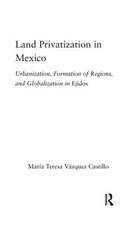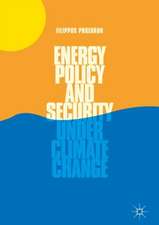EU Energy Security in the Gas Sector: Evolving Dynamics, Policy Dilemmas and Prospects
Autor Filippos Proedrouen Limba Engleză Hardback – 28 ian 2012
| Toate formatele și edițiile | Preț | Express |
|---|---|---|
| Paperback (1) | 338.33 lei 6-8 săpt. | |
| Taylor & Francis – 17 noi 2016 | 338.33 lei 6-8 săpt. | |
| Hardback (1) | 819.90 lei 6-8 săpt. | |
| Taylor & Francis – 28 ian 2012 | 819.90 lei 6-8 săpt. |
Preț: 819.90 lei
Preț vechi: 1102.76 lei
-26% Nou
Puncte Express: 1230
Preț estimativ în valută:
156.90€ • 162.88$ • 130.83£
156.90€ • 162.88$ • 130.83£
Carte tipărită la comandă
Livrare economică 24 martie-07 aprilie
Preluare comenzi: 021 569.72.76
Specificații
ISBN-13: 9781409438045
ISBN-10: 140943804X
Pagini: 192
Ilustrații: Includes 7 b&w illustrations and 9 maps
Dimensiuni: 156 x 234 x 18 mm
Greutate: 0.45 kg
Ediția:New ed
Editura: Taylor & Francis
Colecția Routledge
Locul publicării:Oxford, United Kingdom
ISBN-10: 140943804X
Pagini: 192
Ilustrații: Includes 7 b&w illustrations and 9 maps
Dimensiuni: 156 x 234 x 18 mm
Greutate: 0.45 kg
Ediția:New ed
Editura: Taylor & Francis
Colecția Routledge
Locul publicării:Oxford, United Kingdom
Notă biografică
Filippos Proedrou is a Lecturer in International Relations in City College, International Faculty of the University of Sheffield and DEI College, A registered Centre of the University of London International Programs, Greece
Recenzii
'A fascinating and comprehensive analysis of the major issues at stakes for the future of the EU Energy Security Policy in the Gas Sector. This book offers a detailed assessment of the main achievements by the EU in that field, and soundly highlights the necessary interaction between both internal and external dimensions of the EU energy security policy for gas. It also identifies the right challenges for the EU in the long term.' Sami Andoura, Senior Research Fellow, Notre Europe, France 'Filippos Proedrou’s study is for anyone interested in understanding the European Union’s present energy situation, particularly the gas sector. The book is a well-summarized monograph that deals with salient themes of the EU’s energy security... skilfully weaving facts into a coherent narrative. Proedrou is clearly well-read in energy and international relations; particularly with regard to the gas sector, the complex narrative of the EU’s internal rift due to its intergovernmental and supranational character is tied in well... Overall, this is a solid book when it comes to consolidating facts, records, and reports in a single study.' Slovo
Cuprins
Chapter 1 Introduction; Chapter 2 The Global Context and the Strategies of the Main Importing States; Chapter 3 EU Energy Security; Chapter 4 The Internal Front; Chapter 5 Relations with Russia; Chapter 6 Relations with the Other Producers; Chapter 7 The Way Forward;
Descriere
This book fills an important gap in the literature on energy security in the gas sector in the European Union, shedding light on the state of EU energy security in the gas sector, its interdependence with external suppliers and the current gas strategy. The book concludes with policy recommendations, particularly in the light of tougher environmental regulation.
























